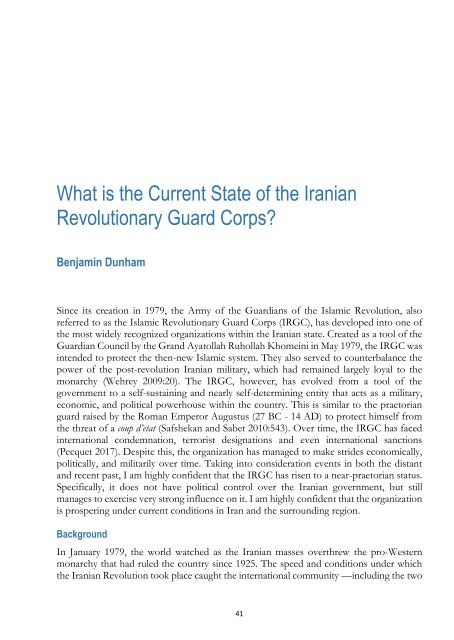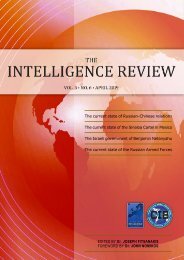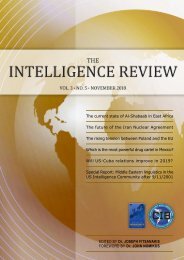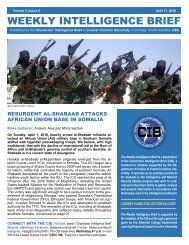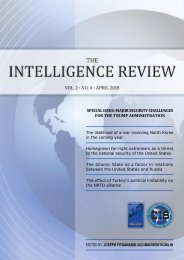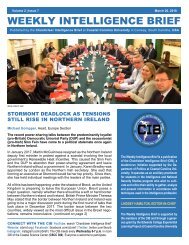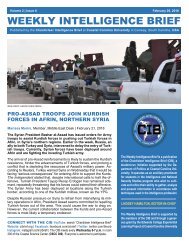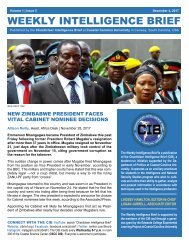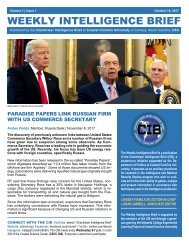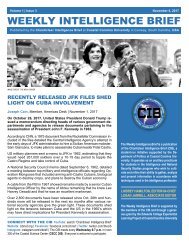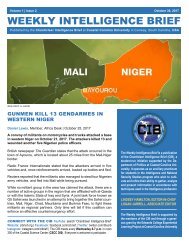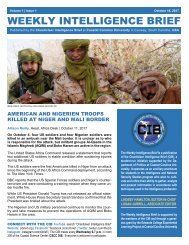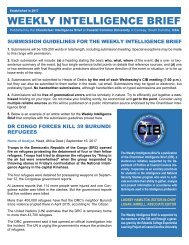The Intelligence Review | volume 2 | issue 3 |
This volume is the product of a collaboration between the European Intelligence Academy (EIA) and the Chanticleer Intelligence Brief (CIB), a student-run initiative supported by the Department of Politics at Coastal Carolina University in Conway, South Carolina, United States. Eight CIB analysts tackle some of the most pressing and timely questions confronting intelligence observers today. Topics in this volume include the current and projected strength of the Islamic State in Libya, the status of unification efforts on the island of Cyprus, the future of the government in Venezuela, and the United States’ place in the Paris climate agreement. There are also papers examining the construction of energy pipelines in Central Asia, as well as aspects of Iranian geopolitics in relation to the United States. Last, though certainly not least, we have included an estimative intelligence analysis of the first round of this year’s presidential elections in France. It refers to an event of global significance that has already taken place. However, it is included in this volume as an illustration of the power of intellectual accuracy and the ability of an intelligence analyst to achieve 100 percent accuracy —as this analyst does— by methodically considering and evaluating the analytical parameters of her question with the right balance of precision and intuition.
This volume is the product of a collaboration between the European Intelligence Academy (EIA) and the Chanticleer Intelligence Brief (CIB), a student-run initiative supported by the Department of Politics at Coastal Carolina University in Conway, South Carolina, United States. Eight CIB analysts tackle some of the most pressing and timely questions confronting intelligence observers today.
Topics in this volume include the current and projected strength of the Islamic State in Libya, the status of unification efforts on the island of Cyprus, the future of the government in Venezuela, and the United States’ place in the Paris climate agreement. There are also papers examining the construction of energy pipelines in Central Asia, as well as aspects of Iranian geopolitics in relation to the United States. Last, though certainly not least, we have included an estimative intelligence analysis of the first round of this year’s presidential elections in France. It refers to an event of global significance that has already taken place. However, it is included in this volume as an illustration of the power of intellectual accuracy and the ability of an intelligence analyst to achieve 100 percent accuracy —as this analyst does— by methodically considering and evaluating the analytical parameters of her question with the right balance of precision and intuition.
Create successful ePaper yourself
Turn your PDF publications into a flip-book with our unique Google optimized e-Paper software.
What is the Current State of the Iranian<br />
Revolutionary Guard Corps?<br />
Benjamin Dunham<br />
Since its creation in 1979, the Army of the Guardians of the Islamic Revolution, also<br />
referred to as the Islamic Revolutionary Guard Corps (IRGC), has developed into one of<br />
the most widely recognized organizations within the Iranian state. Created as a tool of the<br />
Guardian Council by the Grand Ayatollah Ruhollah Khomeini in May 1979, the IRGC was<br />
intended to protect the then-new Islamic system. <strong>The</strong>y also served to counterbalance the<br />
power of the post-revolution Iranian military, which had remained largely loyal to the<br />
monarchy (Wehrey 2009:20). <strong>The</strong> IRGC, however, has evolved from a tool of the<br />
government to a self-sustaining and nearly self-determining entity that acts as a military,<br />
economic, and political powerhouse within the country. This is similar to the praetorian<br />
guard raised by the Roman Emperor Augustus (27 BC - 14 AD) to protect himself from<br />
the threat of a coup d’etat (Safshekan and Sabet 2010:543). Over time, the IRGC has faced<br />
international condemnation, terrorist designations and even international sanctions<br />
(Pecquet 2017). Despite this, the organization has managed to make strides economically,<br />
politically, and militarily over time. Taking into consideration events in both the distant<br />
and recent past, I am highly confident that the IRGC has risen to a near-praetorian status.<br />
Specifically, it does not have political control over the Iranian government, but still<br />
manages to exercise very strong influence on it. I am highly confident that the organization<br />
is prospering under current conditions in Iran and the surrounding region.<br />
Background<br />
In January 1979, the world watched as the Iranian masses overthrew the pro-Western<br />
monarchy that had ruled the country since 1925. <strong>The</strong> speed and conditions under which<br />
the Iranian Revolution took place caught the international community —including the two<br />
41


